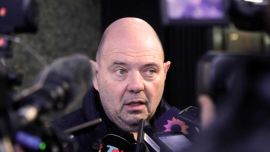No reader is going to believe me but Bolivia had already been pre-selected for today as the next in line in this pre-inauguration series on regional sideshows before Argentina’s new government kicks off – it’s pure serendipity that it’s right at the top of the news this week.
So much so that Bolivia could fill the bulk of this newspaper (and probably will) but only one page for this column. Easy enough to fill with all the semantics over whether or not there was a coup, to which most people reduce the Bolivian conundrum, but let’s not waste time there. If it has four legs and wags its tail, then it is a dog – of course it was a coup but within a context which invites that dangerous question: So what? To give another regional example from the start of the year, a man proclaiming himself president in the middle of the street would normally be taken away by the men in white coats but today that man (Juan Guaidó) is recognised by dozens of serious governments around the world, including Argentina’s, because the country in question is Venezuela.
There are no easy answers in this analysis. It is this column’s contention that Evo Morales was the greatest president in Bolivian history (taking his country into a new dimension even more than Luiz Inácio Lula da Silva in Brazil) but yet he crossed the line long before the forces toppling him and was basically asking for it by outstaying his welcome. A situation where whatever the military did was unconstitutional – in a democracy, the elected head of government is also the commander-in-chief, so any insubordination towards him is unconstitutional, never mind forcing his resignation. But had they obeyed Evo’s orders to assume police powers when the police refused to repress the unrest, this would have violated domestic security legislation.
More space would be required to describe the almost 14 years of the Evo Morales Presidency in full but at least two achievements stand out – the inclusive empowerment of the Amerindian majority, given a face by this pure Aymara (three Bolivians out of every five are indigenous), and creating a public sector in a nation lacking any real state. For all the political extravagances of the “Plurinational State of Bolivia” (its name for the last 10 years), the economy has been throughout in the sound hands of a single minister, Luis Arce (as compared to 10 economy ministers in Argentina since Felisa Miceli in early 2006 when Evo Morales took office).
Space also lacking for a fuller account of the Bolivian model but it can boast impressive macro-economic indicators which would leave crisis-stricken Argentines wondering why there is a problem – thus four percent was the magic number for growth and inflation alike last year while extreme poverty has been halved from the 38 percent of 2006. A hugely expanded budget was nevertheless balanced by aggressive royalties on Bolivia’s wealth of gas and minerals (which now include lithium) while persuading its foreign producers to stay on the basis that the commodity boom as from 2004 would generate enough for everybody with Gross Domestic Product quadrupling from under US$10 billion to over US$40 billion under the Aymara presidency.
But that boom started losing steam five years ago, just when the erosion natural to all lengthy governments was beginning for Evo. That four percent growth and inflation, which Macri must surely envy, has been maintained by letting the fiscal deficit slide to seven percent of GDP instead of austerity with or without the International Monetary Fund – this Bolivian opposite to Argentine stagflation has been defended by methods very similar to Macri’s, increasing foreign debt from under 40 percent to over half GDP while almost halving reserves from US$15 to US$8 billion.
Bolivia’s turmoil today is a tragedy tinged with hubris. Following a quarter-century as trade union leader of coca-farmers in Chapare, Evo Morales reached the presidency legitimately enough in the 2005 elections with 54 percent of the vote (only the third absolute majority in Bolivian electoral history until then). But within two years he was already amending the constitution in order to clinch two more terms, on the grounds that his first pre-reform term did not count. But after two re-elections with over 60 percent of the vote and with the end in sight, an obsessive Evo continued to pursue eternity, submitting a further term to a 2016 referendum which he narrowly lost with 51.3 percent of Bolivians saying a “No,” which he still could not take for an answer. Instead he went to a supine Supreme Court (or Constitutional Plurinational Tribunal, as it is called) on the grounds his human rights to run were being violated. Their unanimous ruling finally cleared the way for last month’s candidacy.
In order to remove any doubts as to those October 20 elections being rigged, Morales interrupted the tally with 84 percent of votes counted when the result (45.7 percent for the multi-term president to 37.8 percent for the main opposition candidate Carlos Mesa) pointed to a run-off – topping 45 percent might remove the need to win by 10 points for first-round election in Argentina (as we saw last month with president-elect Alberto Fernández) but not in Bolivia. When vote-counting was resumed 24 hours later with 95.2 percent of the ballots counted, the incumbent was magically home and dry with 46.86 to 36.72 percent. This turnaround involving tiny percentages might not even have been fraud since over two-thirds of the last 16 percent came from rural districts where Evo’s MAS Movement to Socialism enjoyed huge (if not necessarily fair) advantages. But if Evo could trust in the rural vote to see him through, why suspend the count, thus almost compelling suspicion?
If it had come to a run-off, Morales would have been in trouble because 13 of the 16 percent not voting for either major candidate was hostile (nine percent voted for the Christian Democrats headed by a Korean evangelist and four percent for a candidate running under the label “Bolivia Says No” to remind Evo of his 2016 referendum defeat). Nor was the two-thirds MAS majority in Congress sustainable although it now continues by dint of the interrupted elections.
But instead of a run-off, we have the events described elsewhere in this newspaper – Evo’s forced resignation followed by his Mexican exile, everybody else down the line of succession declining to face the music until the current stand-in Senator Jeanine Añez (although why the Senate minority leader and not Majority Leader Adriana Salvatierra, one might ask?), etc. Today, sadly, no capital in the world has a more ironic name than La Paz.























Comments